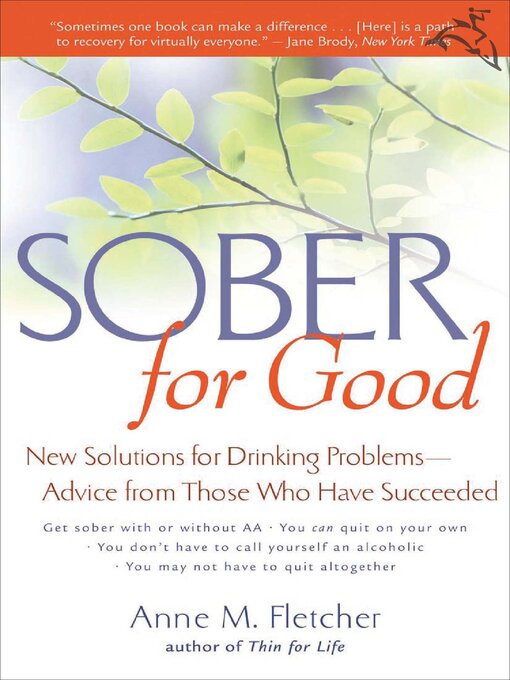Sober For Good
New Solutions for Drinking Problems—Advice from Those Who Have Succeeded
Myth: AA is the only way to get sober.
Reality: More than half the people Fletcher surveyed recovered without AA.
Myth: You can't get sober on your own.
Reality: Many people got sober by themselves.
Myth: One drink inevitably leads right back to the bottle.
Reality: A small number of people find they can have an occasional drink.
Myth: There's nothing you can do for someone with a drinking problem until he or she is ready.
Reality: Family and friends can make a big difference if they know how to help.
Weaving together the success stories of ordinary people and the latest scientific research on the subject, Fletcher uncovers a vital truth: no single path to sobriety is right for every individual. There are many ways to get sober - and stay sober. SOBER FOR GOOD is for anyone who has ever struggled not to drink, coped with someone who has a drinking problem, or secretly wondered, "Do I drink too much?"
-
Creators
-
Publisher
-
Release date
January 17, 2024 -
Formats
-
Kindle Book
-
OverDrive Read
- ISBN: 9780547347288
-
EPUB ebook
- ISBN: 9780547347288
- File size: 988 KB
-
-
Languages
- English
-
Reviews
-
Publisher's Weekly
April 1, 2001
Although Alcoholics Anonymous has long been the preferred (and often court-mandated) regimen for the treatment of alcoholism, its ideology isn't for everyone. As Fletcher (Thin for Life) points out, some people are put off by AA's religious tone, others by the concept of powerlessness over alcohol. And, she says, contrary to AA beliefs, many more never "hit bottom," but nonetheless choose to reconsider their relationship with drinking. Additionally, she suggests, with managed care drastically cutting coverage of inpatient treatment, people with alcohol problems need to know about outpatient alternatives to AA. Fletcher, a health and medical journalist, provides a compendium of such approaches, drawing on the voices of "masters" former problem drinkers who have resolved their problems with alcohol and been sober for at least five years. Programs such as Women for Sobriety, Rational Recovery and Moderation Management provide a variety of approaches, and the "masters" themselves offer a collection of strategies for getting and staying sober with support groups, chemical dependency counselors or a combination of treatments. Unfortunately, Fletcher draws a fuzzy line between "problem drinkers" and "alcoholics," a word she avoids because some find it "pejorative." Maintaining that the distress and dysfunction of most people with drinking problems is not as "severe" as that associated with a stereotypical drunk, she promises that, although AA proponents insist otherwise, "you can quit on your own," "you don't have to quit altogether" and "you don't have to call yourself an alcoholic." Though she sometimes appears to bash AA, Fletcher provides a useful overview of the varieties of recovery programs and practices.
-
Formats
- Kindle Book
- OverDrive Read
- EPUB ebook
subjects
Languages
- English
Loading
Why is availability limited?
×Availability can change throughout the month based on the library's budget. You can still place a hold on the title, and your hold will be automatically filled as soon as the title is available again.
The Kindle Book format for this title is not supported on:
×Read-along ebook
×The OverDrive Read format of this ebook has professional narration that plays while you read in your browser. Learn more here.

